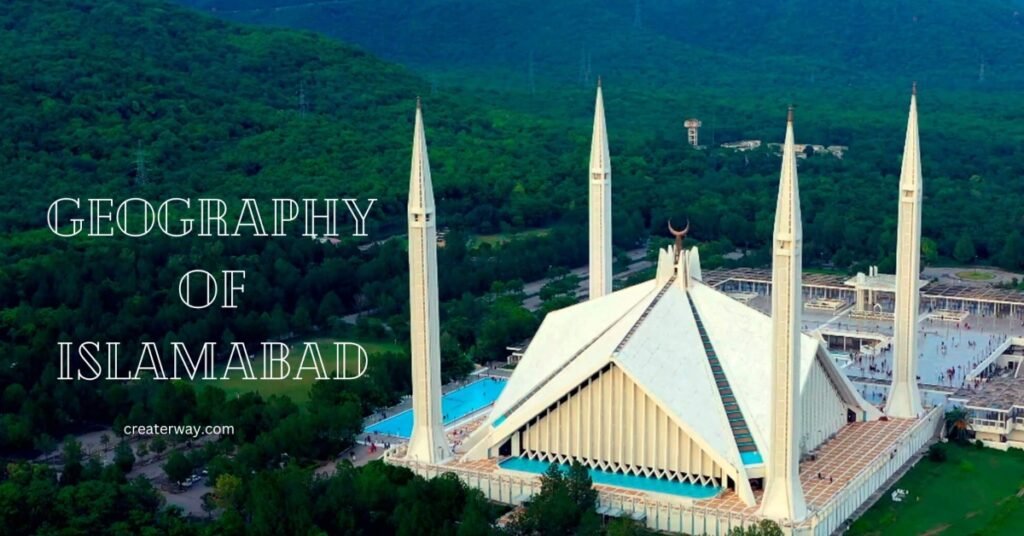GLOBAL NEWS
WHAT IS THE CAPITAL OF PAKISTAN?

What is the capital of pakistan? The capital of Pakistan is Islamabad. The capital city of pakistan is located in the north-central part of the country. And was officially declared the capital in 1967, replacing Karachi as the administrative center of the country. Islamabad is a planned city that was designed by the Greek architect Constantinos Apostolou Doxiadis, and is known for its modern infrastructure, green spaces, and scenic beauty.
Records of Islamabad
Faisal Mosque:
The Faisal Mosque in Islamabad is one of the largest mosques in the world. It was completed in 1986 and can accommodate over 100,000 worshippers at a time. The mosque’s unique design was inspired by Bedouin tents. And it is considered a significant architectural achievement.
Pakistan Monument:
The Pakistan Monument is a national monument and heritage museum located in Islamabad. It was inaugurated in 2004 and is designed to represent and the country’s cultural and historical heritage. The monument consists of four main petals, each representing a province of Pakistan, and three smaller petals representing the territories of Azad Jammu and Kashmir, Gilgit-Baltistan, and the Federally Administered Tribal Areas.
Margalla Hills National Park:
The Margalla Hills National Park is located in the northern part of Islamabad and covers an area of approximately 17,386 hectares. It is home to a wide variety of wildlife, including leopards, monkeys, and various species of birds. The park is a popular destination for hiking and trekking and offers stunning views of the city and surrounding areas.
Islamabad Zoo:
The Islamabad Zoo is located in the foothills of the Margalla Hills and covers an area of approximately 82 acres. It is home to over 300 animals, including various species of birds, primates, carnivores, and herbivores. The zoo is a popular attraction for tourists and locals alike.
Shah Faisal Mosque library:
The library of the Faisal Mosque is one of the largest and most well-stocked libraries in Pakistan. It has a collection of over 100,000 books and journals on a wide range of subjects, including history, religion, and science. The library is open to the public and provides an excellent resource for researchers and scholars.

Geography of Islamabad
Islamabad is the capital city of Pakistan and is located in the northern part of the country, near the border with India. The city is situated at the foothills of the Himalayas, which is one of the world’s most renowned mountain ranges. The geographic coordinates of Islamabad are 33.7294° N, and 73.0931° E. The city covers an area of approximately 906 square kilometers and has an elevation of around 540 meters above sea level. Islamabad is located on the Pothohar Plateau, which is a large, elevated region in northern Pakistan. The city is surrounded by hills and mountains, including the Margalla Hills, which are located to the north of Islamabad.
significance of Islamabad
Political Importance:
As the capital city of Pakistan, Islamabad is the seat of the country’s government, including the President, Prime Minister, Parliament, and Supreme Court. All major political decisions and activities take place in Islamabad, making it the center of political power in Pakistan.
Diplomatic Importance:
Islamabad is home to many foreign embassies and consulates, making it a hub for diplomatic activity. Diplomatic missions and international organizations play a crucial role in the city’s economy and culture, bringing together people from different countries and fostering diplomatic relations.
Economic Importance:
Islamabad is a rapidly growing city with a strong economy. It is home to many multinational corporations and startups, making it a hub for business and investment. The city’s strategic location and well-connected transportation infrastructure make it an attractive destination for businesses looking to expand in South Asia.
Educational Importance:
Islamabad is home to several prestigious universities and research institutions, including Quaid-e-Azam University, COMSATS University, and the Pakistan Institute of Development Economics. These institutions attract students and researchers from all over the world, making Islamabad an important center of higher education and research in Pakistan.
Cultural Importance:
Islamabad is a melting pot of different cultures and traditions. The city is home to many museums, art galleries, theaters, and cultural centers that promote art, literature, and music. The city’s diverse population and rich history have made it a hub for cultural exchange and expression.
The layout and structure of Islamabad
The layout and structure of Islamabad were designed by Greek architect Constantinos Apostolou Doxiadis in the 1960s. And the city is known for its modern architecture, spacious streets, and green spaces.The city is divided into eight zones, labeled A through H, with each zone designated for a specific purpose. For example, Zone A is the diplomatic area, while Zone E is the commercial and business district. The zones are interconnected by a network of well-planned roads and highways, making it easy to navigate around the city.
Natural beauty and visitor points of interest in Islamabad
Margalla Hills National Park:
This is a vast expanse of natural beauty and one of the most popular destinations for tourists and locals alike. It is located at the foothills of the Himalayas and covers an area of approximately 17,386 hectares. The park is home to a variety of wildlife and bird species, including leopards, monkeys, and eagles. Visitors can enjoy hiking, rock climbing, bird watching, and picnicking in this picturesque area.
Rawal Lake:
This is a beautiful artificial lake located on the outskirts of Islamabad. It was created in the 1960s by damming the Korang River, and it provides a serene environment away from the hustle and bustle of the city. Visitors can enjoy boating, fishing, and picnicking at the lake.
Faisal Mosque:
This is one of the largest mosques in the world and an iconic landmark of Islamabad. It is a stunning piece of modern architecture, with a unique design inspired by a Bedouin tent. The mosque can accommodate up to 100,000 worshippers and is open to visitors of all faiths.
Lok Virsa Museum:
This is a cultural museum that showcases the diverse cultural heritage of Pakistan. The museum features a collection of artifacts, traditional costumes, musical instruments, and handicrafts from different regions of the country. Visitors can learn about the rich history and cultural traditions of Pakistan at this fascinating museum.
Daman-e-Koh:
This is a hilltop viewpoint that offers stunning panoramic views of the city and its surroundings. It is located at the top of Margalla Hills and is accessible by road or hiking. Visitors can enjoy a cup of tea or a snack at the café while taking in the breathtaking views of Islamabad.
The economic significance of Islamabad
Business Hub:
Islamabad is a rapidly growing business hub and a major contributor to Pakistan’s economy. The city is home to several multinational companies, banks, and financial institutions. The commercial district of Islamabad, known as the Blue Area, is a bustling center of business and trade.
Real Estate:
The real estate sector in Islamabad is thriving due to the city’s planned development and attractive urban environment. The city’s housing societies offer a range of housing options, from luxurious villas to affordable apartments. The real estate sector has been a major driver of the city’s economy, providing employment opportunities and generating significant revenue.
Tourism:
Islamabad is a popular tourist destination, attracting visitors from all over the world. The city’s natural beauty, cultural heritage, and modern infrastructure make it an attractive destination for tourists. The tourism industry has been a significant contributor to the city’s economy, creating employment opportunities and generating revenue for local businesses.
IT Industry:
The information technology (IT) industry in Islamabad is rapidly growing, with several IT companies and startups based in the city. The government has taken steps to promote the development of the IT industry, including the establishment of software technology parks and tax incentives for IT companies. The IT industry has the potential to become a major contributor to Islamabad’s economy in the coming years.
Education:
Islamabad is home to several prestigious universities and educational institutions, including the Quaid-i-Azam University, the National University of Sciences and Technology, and the International Islamic University. The city’s education sector is a significant contributor to the economy, providing employment opportunities and attracting students from all over the country.
Delicacies and Meals in Islamabad
Nihari:
This is a popular dish in Islamabad and a must-try for any food enthusiast. It is a slow-cooked stew made with beef or lamb.And it is usually served with naan bread. Nihari is traditionally eaten for breakfast, but it can also be enjoyed for lunch or dinner.
Chelo Kebab:
This is a Persian dish that has become popular in Islamabad. It is a combination of saffron rice, grilled kebabs, and a side of grilled tomatoes and onions. Chelo Kebab is a favorite among meat lovers and is often served in high-end restaurants.
Haleem:
This is a popular dish during the holy month of Ramadan, but it can be found in restaurants throughout the year. Haleem is a thick stew made with lentils, meat, and spices. It is usually served with naan bread or crispy fried onions on top.
Biryani:
This is a classic South Asian dish that is popular in Islamabad. It is a spicy rice dish that is often made with chicken or lamb, and it is flavored with a variety of spices and herbs. Biryani is a favorite among locals and visitors alike, and it is often served with raita or chutney.
Chaat:
This is a popular street food in Islamabad and throughout Pakistan. Chaat is a savory snack made with a variety of ingredients. And including chickpeas, potatoes, yogurt, and spices. It is usually topped with tamarind chutney, mint chutney, and crispy fried noodles.
Barbecue:
Islamabad is known for its delicious barbecue, which is often served at street stalls and restaurants. The meat is marinated in a spicy blend of herbs and spices and then grilled over charcoal. Barbecue is usually served with naan bread, chutney, and salad.
Climate and weather in Islamabad
Islamabad has a moist subtropical climate, with hot summers and cool winters. The city gets the maximum of its rainfall in the monsoon season, which runs from July to September.No matter it’s quite moderate weather, Islamabad can revel in severe climate activities, including heatwaves and heavy rainfall. In recent years, the city has additionally experienced several earthquakes. And which have brought about enhancements in building codes and earthquake-resistant design.



















